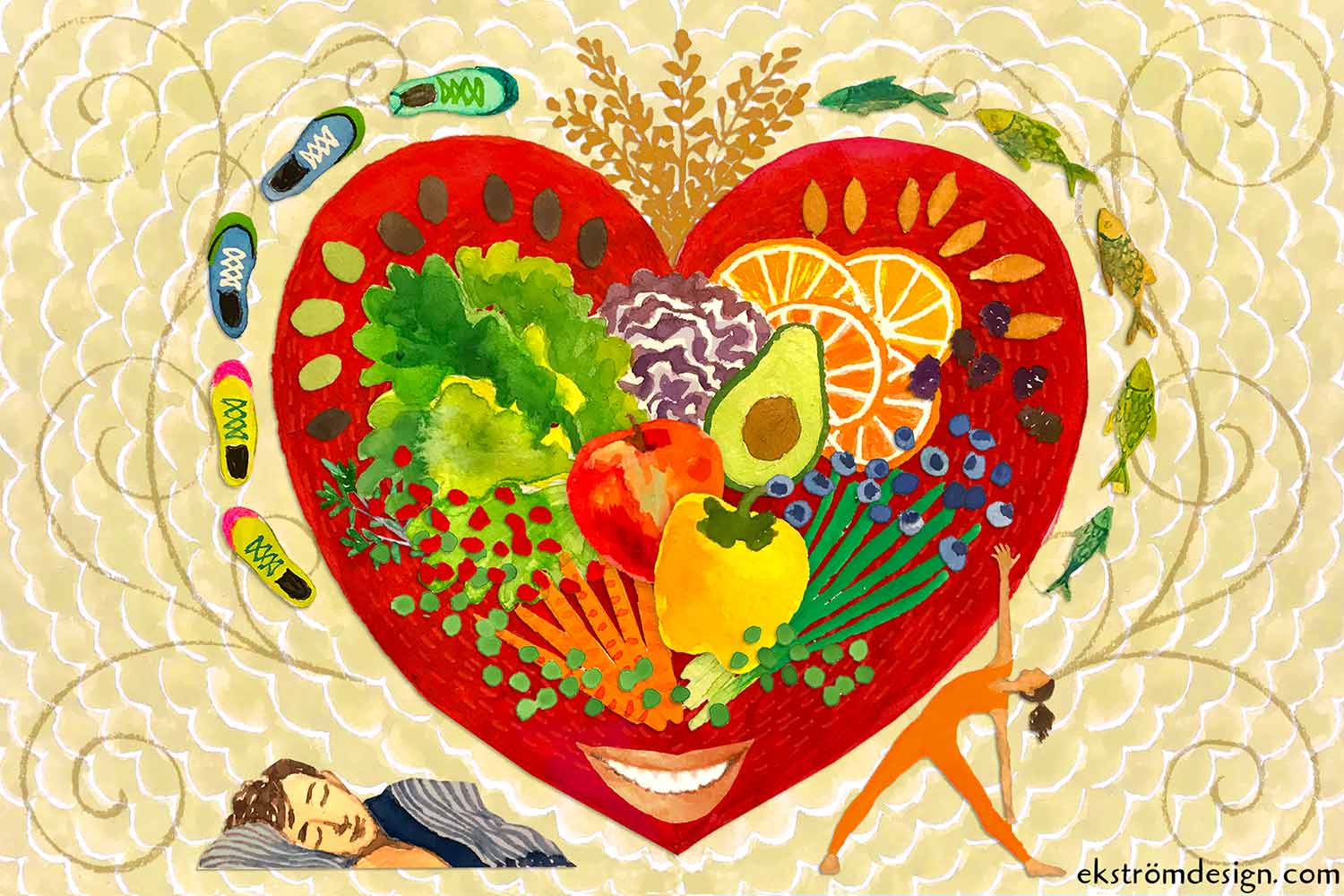Nourish 02/ 26/ 2020
5 Steps to Take To Build A Healthier Relationship With Food, Eating & Your Body

There are a number of factors that influence your eating habits and weight, including genetics, childhood upbringing, stress levels, subconscious programs and much more. Often your relationship with food and your body is quite complex, beginning from the moment you were born and evolving until now. It takes time to change unhelpful patterns of thinking about yourself, break poor eating habits and develop a healthier relationship with food, eating and your body. Here are 5 steps to take today to get started:
- Forgive yourself and your body. That’s right, the first place to start is with self-forgiveness. Are you angry with yourself for “letting yourself go” or not “doing better” with eating and exercise? A lot of my clients report this, as well as feeling angry with their bodies for “failing” them. Here’s the thing; being critical of yourself isn’t going to do any good in helping you make positive changes to improve your health. If anything, this self-criticism, anger and judgment simply make things worse, creating a barrier to moving forward with ease and enjoyment. You cannot go back in time and undo your past choices, all you have is this present moment. Forgive yourself for your perceived wrongdoings. Forgive yourself for not doing “good enough” or meeting yours or others expectations. And forgive your body for not being the way you wish it would be. The truth is your body is simply a reflection of the way you’ve treated it as a result of your eating, exercise and behavioral choices. And the good news is that it will respond favorably to the improvements you make. Become an ally with yourself and your body, leaving the past grudges behind, and empowering yourself to have a more compassionate attitude instead.
- Give gratitude to your body daily. Usually, it’s common for people to hyper-focus on everything that is “wrong” with their body. What I hear most often is people complaining about being overweight and carrying excess fat on their body. Do you identify with your weight, believing that your weight equals your worth? If so, this is a very inaccurate perception of your value that bypasses acknowledging all the things that are right and good about your body and yourself. In the world of therapy it’s called minimization, which describes the human tendency to minimize the many positive aspects of a situation and maximize the one perceived negative thing. To begin addressing this tendency, combat your negative body-talk by giving gratitude to your body daily. Write down 5-10 things that you are grateful for about your body. This could include things such as thanking your: legs for carrying you up a flight of stairs, stomach for digesting food, eyes for seeing the sunrise, skill for healing a wound, heart for beating and keeping you alive, etc. The list of possibilities is endless if you set the intention to truly acknowledge all your body does for you, every minute of every day, to keep you alive, thriving and well.
- Stop labeling food as good or bad. Chances are you have a few ideas of what foods you think are “good” or healthy foods to eat and “bad” and unhealthy foods to eat. However, when you use the language of “good” and “bad” to label foods, then it can often lead you to conclude that you are “bad” for eating a “bad” food. The concept of being good and bad implies on a deeper subconscious level that if you’ve been “bad” or “sinned” then you are guilty and deserve to be punished, whether through your words or actions. Furthermore, I often see the pattern of people concluding that since they’ve already eaten “bad” then they might as well continue to eat junk, resulting in overeating or binge eating. These patterns of thought and eating habits are worth stopping immediately. The easiest way is to simply drop the labels of “good/bad” altogether. Instead, describe foods using their names or facts about their nutritional content. For example, a salad with lots of organic vegetables is a nutrient-dense food choice while an ice cream sunday is a low-nutrient food choice. Choose which foods you will eat based on their nutritional content and how these foods make you feel after you eat them. If you feel tired and sluggish after eating something then you may opt not to eat that food again, not because it is “bad” but because it doesn’t truly make you feel healthy and isn’t moving you towards your health goals.
- Practice eating mindfully without distractions. If you’re someone who eats on-the-go, eats at your desk or in your car, or multitasks while eating then you will benefit greatly from aiming to improve how you eat as much as what you eat. Studies show that practicing mindful eating can help improve digestion, increase satisfaction while eating, strengthen the mind-body connection and allow you to more easily stop eating when you’re satisfied. This is also a great skill to practice if you have a tendency to clear your plate or eat an entire box of something without realizing it until after the fact. That shows your brain is eating mindlessly. Shifting into a state of mindfulness requires you to eliminate all distractions while eating. Turn of the TV, put away your phone and actually sit down at a table with just your meal. Focus 100% of your attention and five senses on your food. How does it look, smell, feel, sound and taste? Immerse yourself in the sensory experience of eating as if this was your last meal on Earth. Savor each bite, chewing your food thoroughly and noticing how your body responds. Aim to take 20 minutes to eat your meal, which is how long it takes for your body to register feelings of fullness. When you eat this way, it is much easier to stop eating when you’re satisfied and avoid the discomfort that can come from mindless eating.
- Distinguish physical hunger from emotional hunger. Increasing your awareness of what type of hunger you’re experiencing can be a game-changer in helping you not only improve your relationship with food and your eating habits, but also in helping you improve your emotional awareness and regulation. This especially applies if you are a stress or emotional eater. Often times you may find yourself reaching for food without stopping to ask if you’re actually hungry. Indications that you are experiencing physical hunger are: it has been a few hours since you last ate, your stomach is grumbling and you may feel “hangry” or faint, and usually any food sounds appealing. On the other hand, emotional hunger usually strikes in the form of a food craving, meaning only certain foods will satisfy. If you have a fridge full of food and you decide to go drive to get the fast food you are craving then this may mean there is an inner emotion stirring that’s causing you to desire comfort foods to sooth that feeling. Furthermore, emotional hunger tends to come on suddenly and can emerge even when you know you’re full or have already eaten enough. If you can identify that you’re experiencing emotional hunger, then it is a great opportunity to respond to your emotion in a more effective way other than eating. For example, if you are feeling stressed after a long day of work and are craving a glass of wine to unwind at night, instead you can try to release the stress by exercising, practicing deep breathing, taking a bath or doing a meditation. In doing so, you teach your brain and body other ways to effectively respond to emotions as they arise rather than turning to food as an emotional soother.
Sarah Speers, LMFT,
Previous post
No More Counting Sheep: 5 Easy Steps To Improve Your Sleep
Next post



